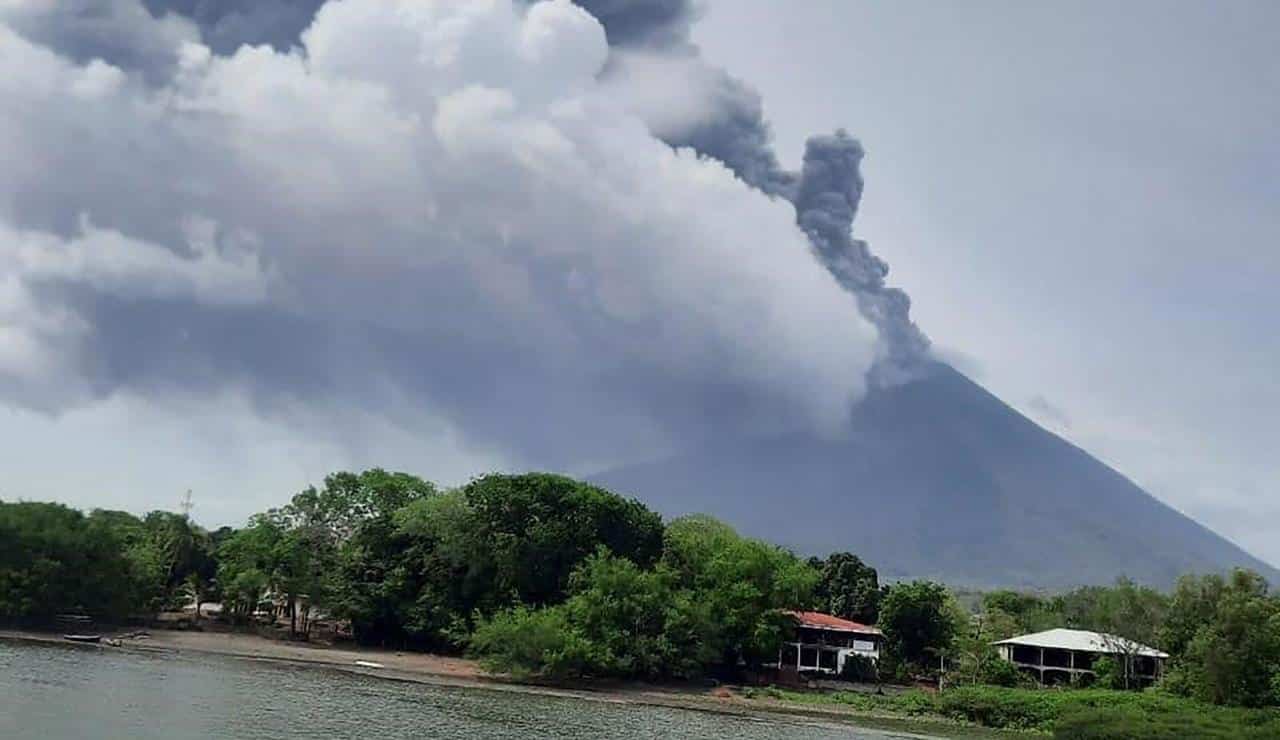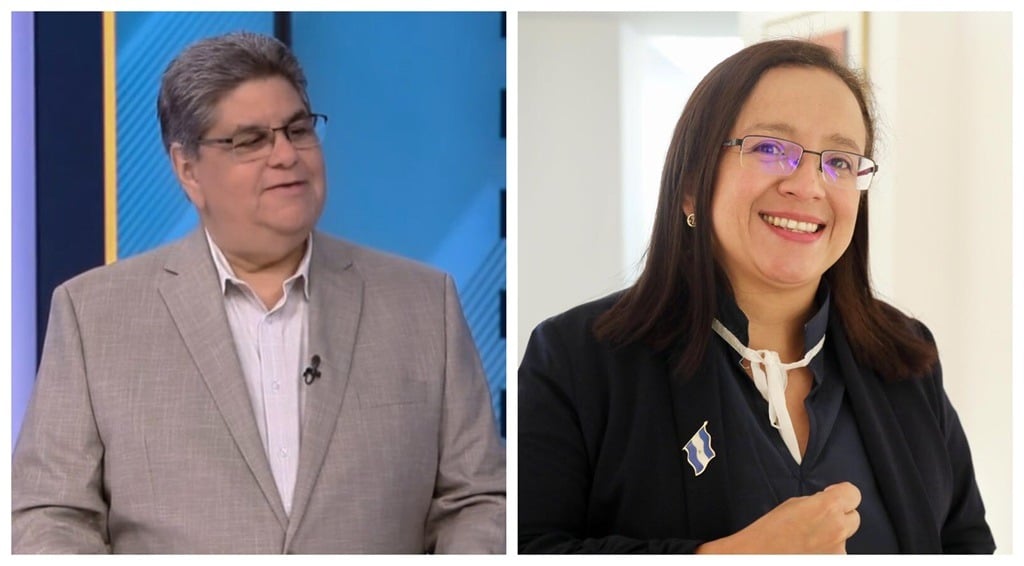7 de mayo 2024

Strong Explosions from Concepcion Volcano on Ometepe Island, Nicaragua

PUBLICIDAD 1M
PUBLICIDAD 4D
PUBLICIDAD 5D
Lucía Pineda and Eduardo Enríquez: “Independent journalism is defeating censorship and is preparing for the worst: the control of internet content"

On Friday, May 3rd, as the world commemorated World Press Freedom Day, Nicaragua's independent press continued to operate from exile, while the Ortega Murillo regime unveiled a new law to exert control over content broadcast over the Internet.
On the show Esta Semana, which is broadcast on CONFIDENCIAL's YouTube channel to overcome television censorship, we talked to journalists Lucia Pineda, director of 100% Noticias, and Eduardo Enriquez, general editor of the newspaper La Prensa, two of the three media confiscated by the Ortega Murillo dictatorship.
We asked them how quality journalism is produced from exile, how audiences in Nicaragua respond, and what the new internet law would mean for citizens and journalists, and this is what they told us.
On World Press Freedom Day, Nicaragua stood out as one of the countries with the worst levels of press freedom and freedom of expression criminalization. But despite that, it also stands out because the independent press continues to do quality journalism from exile. How do you do journalism?
Eduardo Enriquez. With great difficulty. As Lucía knows very well, we work with great difficulty, because one of our main objectives is not only to inform but to inform with the truth, to combat disinformation, and to combat all the false information put out by the regime. And to obtain that information truthfully and objectively, we must work very carefully. Sometimes the process is slow and tortuous because we do not have the facilities we had there [in Nicaragua].
We continue to have sources who inform us, people who are protected by anonymity who confirm information, and on our side we are constantly aware of everything that happens in Nicaragua and analyzing every step taken by the regime to be able to inform the public about it.
What has happened with the confiscated media, the facilities of La Prensa, and 100% Noticias? I remember an alleged addiction clinic was inaugurated at the former 100% Noticias building.
Lucia Pineda. Yes, the addictions clinic scarcely works. It’s empty, with barely any personnel, and no patients arrive. It is a façade to mask the blatant theft and the transfer [of the building] to the Ministry of Health. I remember that Confidencial managed to do a report and no one was arriving at the clinic.
Now our colleague Miguel Mendoza shared a photograph of the interior of the facilities of 100% Noticias and there are only empty chairs, a mural, and a person in an office. At La Prensa, we see a bit more activity.

The Confidencial newsroom was turned into a supposed maternity clinic where there are no services for pregnant women. What was there in 2021 were some policemen who were keeping watch. They tried to hide a crime against a media outlet with made up health services. In the case of La Prensa, they installed a training center by the National Technological Institute (INATEC).
Eduardo Enriquez. They say it’s supposed to be a training center. As far as we have been able to see, they did remodel the buildings. They mention some amounts [of money] that they are investing in the buildings, but the sums seem to be quite inflated. All this is simply to give a façade to the blatant theft they have committed against the independent media facilities.
When people are asked in surveys how they get information in Nicaragua, the predominant answer is –I get information through social networks because I heard it on Facebook or because I have an aunt who’s in a WhatsApp group, and information is shared there. Is what is shared on social networks verified information, does it compete with independent media?
Lucia Pineda. People tend to say that, but as media, we also use those distribution channels. What has caught my attention is that people are accessing more news sites, and they refrain from commenting on social networks, on Facebook, because of the growing fear of surveillance of the Ortega Murillo dictatorship. People who are inside Nicaragua go directly to the media sites.
In social networks they can throw information at you that is not verified, we as media have to be attentive to what is also circulating in the networks and verify. There are all sorts of things on social media and since we are abroad, we also do a lot of monitoring of what people are talking about, in TikTok, what is being talked about on Facebook, on Twitter, and what is being talked about in Nicaraguan families, at the bus stops, when people go to bring their remittance, on the bus. That's where you get an idea of how the atmosphere is, and that's how you measure more or less the feelings of the Nicaraguan population.
What do the official media contribute to Nicaraguan society? The daily monologue of Rosario Murillo, how many people listen to her? The national chains of Daniel Ortega, people say – he is going to repeat the same speech he said 50 days ago. But there is a machinery of radios, of television channels.
Eduardo Enriquez. The two of them, Ortega and Murillo, as rulers, not to say dictators, do not contribute much in terms of information, and Ortega, we already know, repeats the same tired speech whether he is in the square, in front of Carlos Fonseca's tomb, in Caracas or Havana, it is always the same tired speech.
She does not provide any kind of information. Murillo limits herself to giving information of very little value, when she is not insulting, when they are not key dates, such as those of April, which practically get her out of control.
Yes, there's a vast machinery at work, but it still delivers information that isn't very useful or interesting to people. This is evident in what we observe, in what the public chooses to follow or get informed by through them [government channels], compared to what they learn from independent media sources.
Social networks - including WhatsApp and Telegram - I interpret as two-way channels. On one hand, they help to disseminate the information so that people ultimately reach our platforms. But it's also about taking information to where people are, and people are frequently on social media and WhatsApp, perhaps a bit less on Telegram.However, it's also important to monitor them because there, citizens, using pseudonyms or however they choose, also inform and denounce. Then comes the journalist's job of following up on that information, confirming it, expanding it, contextualizing it, and that's where we can already provide concrete, useful information for the citizen.

How is journalism in exile in Nicaragua perceived internationally? Obviously, we are in a world where exile journalism has been practiced in Cuba for dozens of years, also in Venezuela, in Russia, in Iran, and many other countries. How is the quality of exile journalism in Nicaragua perceived?
Eduardo Enriquez. I have received very good feedback about the journalism we, independent journalists, do in general. The effort made to maintain accurate, objective information, to combat misinformation and fake news, and to provide useful information to Nicaraguans. This is valuable for those inside the country, those abroad who have been away for many years but still have an interest in what's happening in Nicaragua, and for those in the process of leaving, thinking about emigrating to Costa Rica, the United States, or Spain. We need to consider all these audiences.
We have been trying to provide useful information for all of them and we have found that the audience is very receptive. Of course, we cannot forget or overlook all the cases of corruption and these incredible cases that happen when certain individuals fall from grace, as those are obviously pieces of information that arouse a lot of interest.
But equally important are the pieces of information that directly affect people, such as economic issues, also the price of basic goods, and the situation of remittances; all that information is of great interest. At La Prensa, we have chosen to continue being, as much as possible, a comprehensive source. We even report on entertainment when possible, and on sports, constantly and with a very active section, because we consdier that the audiences need that kind of information and not necessarily from government-owned media. People cannot trust what the media of the regime are serving them. That is why they always turn to independent media, to what they have always trusted.
Are we prepared for the future which could be even worse? Confidencial published information about the new Telcor Law, which intends to regulate content that is disseminated through the Internet. Will the pressure on citizens who inform themselves through independent media increase even more? This law could have an impact on the producers of information contents, are we prepared for that possibility?
Lucia Pineda: We have been clear that this could happen at any time. As media outlets, we have to prepare for this possibility by launching a campaign to offer alternative options to the audience within Nicaragua. We are already preparing an educational campaign for the use of VPNs so that people can access our website if they start blocking websites as they have done in Venezuela. I think that will work; it has worked even with all the limitations, restrictions, and threats that the regime has imposed on the Nicaraguan population, who only want them to see their channels or their media. Despite these limitations, people have continued to seek us out, even with our own restrictions on reporting from outside Nicaragua, so that they don't lose contact with the independent media outlets that are working from exile.
Eduardo Enriquez: It's clear to me that the regime's rapprochement with China, Russia, and Iran – countries that have tried to block independent information for their citizens – is a step that is being taken in that direction.
They have had enough time, but they are trying to see how to deny access to Nicaraguans. However, not even in China, nor in Russia or Iran, has a total blockade been achieved and they are not going to achieve it in Nicaragua either. Obviously what we are doing is the right path, preparing ourselves in different ways, not necessarily going into details of what kind, but preparing ourselves so that people have access to our information, always. We have to think about the worst, and these people have done the worst and even surpassed us in what we can imagine. So, yes, we have to be preparing for that pretty bad future.
This article was published in Spanish in Confidencial and translated by our staff. To get the most relevant news from our English coverage delivered straight to your inbox, subscribe to The Dispatch.
PUBLICIDAD 3M
Periodista nicaragüense, exiliado en Costa Rica. Fundador y director de Confidencial y Esta Semana. Miembro del Consejo Rector de la Fundación Gabo. Ha sido Knight Fellow en la Universidad de Stanford (1997-1998) y profesor visitante en la Maestría de Periodismo de la Universidad de Berkeley, California (1998-1999). En mayo 2009, obtuvo el Premio a la Libertad de Expresión en Iberoamérica, de Casa América Cataluña (España). En octubre de 2010 recibió el Premio Maria Moors Cabot de la Escuela de Periodismo de la Universidad de Columbia en Nueva York. En 2021 obtuvo el Premio Ortega y Gasset por su trayectoria periodística.
PUBLICIDAD 3D